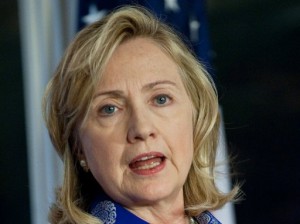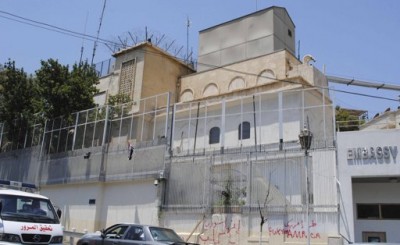
A mob attack on the U.S. embassy in Damascus pushed Secretary of State Hillary Clinton to say Syrian President Bashar al-Assad has lost legitimacy, a pronouncement the Obama administration had been reluctant to make in four months of anti-regime protests.
“From our perspective, he has lost legitimacy. He has failed to deliver on the promises he’s made. He has sought and accepted aid from the Iranians” on how to suppress his own people, Clinton said today in Washington in a joint news conference with European Union foreign policy chief, Catherine Ashton.
“President Assad is not indispensable and we have absolutely nothing invested in him remaining in power,” Clinton said.
The direct attack on the Syrian leader by the top U.S. diplomat marks a shift in tone from when she acknowledged in March that some U.S. lawmakers saw him as a reformer. Ten days ago, while traveling in Lithuania, Clinton warned the Syrian leader that he was “running out of time” to meet the demands of anti-government protesters.
Tensions between the two countries have escalated since last week when Robert Ford, the first U.S. ambassador to Syria in six years, traveled to Hama, an anti-regime hot spot, and met with residents. Syrian authorities said the visit was unauthorized and was proof the U.S. was seeking to “incite” rebellion.
Climbing Walls
Since Ford’s trip, Syrian demonstrators have gone from throwing eggs and tomatoes at the U.S. and French embassies in Damascus, to climbing over compound walls and injuring three French guards.
 Encouraged by a pro-regime television station, about 300 people infiltrated the compound of the U.S. embassy today, with some demonstrators climbing the roof before the U.S. Marines intervened to disperse them, State Department spokeswoman Victoria Nuland said in Washington. Protesters wrote anti- American graffiti on the walls of the building, broke windows and security cameras.
Encouraged by a pro-regime television station, about 300 people infiltrated the compound of the U.S. embassy today, with some demonstrators climbing the roof before the U.S. Marines intervened to disperse them, State Department spokeswoman Victoria Nuland said in Washington. Protesters wrote anti- American graffiti on the walls of the building, broke windows and security cameras.
The French embassy also was attacked today for the second day in a row. Three guards were hurt and the French ambassador’s car was destroyed, according to a statement by the French Foreign Ministry. French security fired shots in the air to disperse the mob, the statement said.
Hama Trip
Ford traveled through a military and civilian checkpoint to reach the city of Hama July 7, where he spoke to more than a dozen residents and visited a hospital. The French Ambassador to Syria, Eric Chevalier, also went to Hama and visited wounded people and their families at a hospital.
Clinton said the Assad regime was using the anti-American protests to divert attention from its brutality.
“By either allowing or inciting this kind of behavior,” Clinton said, Syrian leaders “are clearly trying to deflect attention from their crackdown internally and to move the world’s view away from what they’re doing and create some kind of ongoing conflict between Syrians and people like our diplomats.”
Anti-regime protests that began in March have posed the biggest challenge to Assad’s rule since he inherited power from his father, the late President Hafez al-Assad, 11 years ago. They have been part of a wave of unrest across the Middle East and North Africa this year that has unseated the leaders of Egypt and Tunisia.
Crackdown in Homs
Syrian forces entered the city of Homs late yesterday, killing at least three anti-government protesters and wounding dozens of demonstrators, as opposition leaders boycotted a second day of regime-sponsored reconciliation talks, Mahmoud Merhi, head of the Arab Organization for Human Rights and Ammar Qurabi, head of the National Organization for Human Rights in Syria, said by telephone today.
More than 30 people were arrested today in the port city of Latakia and the southern province of Daraa, where the protests against Assad’s regime began four months ago, according to Merhi. Door-to-door searches were being conducted by Syrian security forces in Homs, Qurabi said.
Fifteen cars were burned and more than 28 people were wounded in the operation that followed rallies over the weekend by hundreds of thousands of anti-government protesters opposing President Assad’s rule, Qurabi said.
At least 20 people were killed July 8 as 500,000 people rallied in Hama to call for the fall of Assad’s government, according to Merhi and Qurabi.
Death Toll
Assad has blamed the protests on a foreign conspiracy, while saying that the demands of demonstrators “have merit” and that changes are needed. The crackdown in Syria has left more than 1,700 dead, according to rights groups. At least 20,000 people have been arrested since the demonstrations began, with half still in detention, Qurabi said.
Thousands of Syrians have fled across the border to Turkey to escape violence in northern towns, straining relations between the countries. A total of 8,579 Syrians remain in camps in Turkey set up by the Turkish Red Crescent in the province of Hatay, the country’s Disaster and Emergency Management Presidency said today in a statement. As many as 15,441 people entered Turkey during the upheaval, it said.

Leave a Reply
You must be logged in to post a comment.